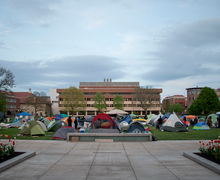Record number of student veterans enrolled in SU this fall
Corey Henry | Photo Editor
The veteran and military-connected students in the Class of 2023 form the largest amount of student veterans enrolled at SU in the post-9/11 era.
Syracuse University saw a record high in veteran and military-connected student enrollment this fall.
The university’s total veteran and military-connected student enrollment rose 14% this fall, bringing the total enrollment to its highest point in five years, according to an SU News release. The Class of 2023 also features the largest amount of student veterans enrolled at SU in the post-9/11 era.
Student veterans said SU’s demonstrated commitment to military-connected students and the programs offered to support them were a large factor in their decision to attend the university.
“From your first days at the university to going out and getting a job after graduation, there is a program or person to help you with anything you might need,” said Katherine Quartaro, a veteran and SU graduate student, in an email.
Most colleges and universities accept the GI Bill, a piece of legislation designed to aid veterans in their life after service. For eligible initiatives, SU’s Yellow Ribbon Program can also cover tuition costs the GI Bill doesn’t.
The Yellow Ribbon Program was a large draw in her decision to attend SU, Quartaro said. While other schools had limitations in their coverage, SU would cover the difference between tuition funding from the Department of Veterans Affairs and student veteran tuition, she said.
Construction is ongoing on the National Veterans Resource Center, a $62.5 million center that will consolidate the university’s veteran services into one 115,000 square foot facility. The center will house the Institute for Veterans and Military Families, the university’s ROTC programs and the Office of Veteran and Military Affairs.
The NVRC is expected to open to the public in early spring 2020. Its construction shows a commitment to not only veteran and military-connected students but also to the military and all veterans, Quartaro said.
“People notice things like that,” she said.
SU, unlike other universities, also has a separate webpage for interested veterans, Quartaro said. The website shows the emphasis SU places on veterans, she said.
Service to School, a nonprofit that helps veterans with their applications to colleges and universities, recommended SU to veteran Mindy Barhaug, she said in an email. Barhaug, now a junior in the College of Arts and Sciences, said she was looking for a school with a veteran community and veteran support, as well as people she could relate to.
“There literally are so many programs for veterans that I’m sure there are plenty more I don’t know about,” Barhaug said.
Barhaug said the Student Veterans Organization, of which she is a board member, is a helpful outlet for veterans. Student veterans new to the university are also assigned a peer advisor through the national Peer Advisors for Veteran Education program. Barhaug, who served in the Air Force for almost 13 years and had been out of school for years, said the program was beneficial for her.
Despite this, Barhaug said she had a difficult time transitioning into college, being in her 30s and surrounded by younger peers. She wishes tutors were offered during the first semester to help student veterans feel more confident in adjusting to being a student, she said.
Barhaug also said she deals with anxiety stemming from a few of her deployments, and she sometimes wishes the professors were more aware of the effects of her anxiety both inside and outside the classroom. There is, however, a program or person at SU to help solve any issues students run into, Barhaug said.
“It’s great to be able to attend a school like this but still have support from peers that understand you a bit more that the general population,” Barhaug said.
Published on October 9, 2019 at 10:19 pm
Contact Louis: [email protected]




